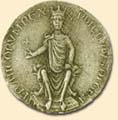![]() Capetian versus PlantagenÍt : the endless war
Capetian versus PlantagenÍt : the endless war
 The relationship between the King of
England and the King of France placed the former in a theoretical position of
subjection because of the homage, due as a vassal, from the Plantagenet to the
Capetian on account of the former's continental possessions.
The relationship between the King of
England and the King of France placed the former in a theoretical position of
subjection because of the homage, due as a vassal, from the Plantagenet to the
Capetian on account of the former's continental possessions.
In 1151 Henry had paid homage to King Louis VII for the Duchy of Normandy. In 1156, having become king, he had renewed the homage for all his continental possessions in order to keep them out the hands of his brothers. In 1169 Louis VII recognised the authority of the Plantagenet over his domains related to his kingdom, but in exchange received the homage of Henry and his sons for Normandy, Maine, Anjou, Brittany and even Aquitaine, although it was beyond his reach. On the other hand, in 1173, Henry II called upon Louis VII's help against his rebellious sons and vassals by virtue of the obligations of a lord under attack within his fiefdom.
The issue of Vexin remained the principal factor in the conflict. Attempts to resolve this were worked out by princely marriages. A daughter of Louis VII, Margaret, was married to Young Henry, another, Alice, was betrothed to Richard. However, the first marriage ended in widowhood (1183) which only served to make the issue of Margaret's dowry, Norman Vexin, more acrimonious. Alice for her part remained a sort of hostage in the diplomatic game between the two parties. No marriage was concluded.
 Having become king, Philip Augustus
knew how to exploit the divisions of the Plantagenets by turning to his
advantage the bonds of vassalage which formed the basis for the cohesion of
their states. In 1183 he only allowed the Plantagenet possession of Norman
Vexin in exchange for the renewal of homage. In 1186, on the death of
Geoffrey, son of Henry II, Philip Augustus could aspire to exert control over
his Duchy of Brittany as a direct overlord.
Having become king, Philip Augustus
knew how to exploit the divisions of the Plantagenets by turning to his
advantage the bonds of vassalage which formed the basis for the cohesion of
their states. In 1183 he only allowed the Plantagenet possession of Norman
Vexin in exchange for the renewal of homage. In 1186, on the death of
Geoffrey, son of Henry II, Philip Augustus could aspire to exert control over
his Duchy of Brittany as a direct overlord.
Finally, in 1189 Richard, who was impatient to obtain from his father the recognition of his right as an heir, withdrew his loyalty and transferred it to Philip Augustus. Many vassals took advantage of this to abandon Henry II who resigned himself to defeat before dying on 6 July 1189.